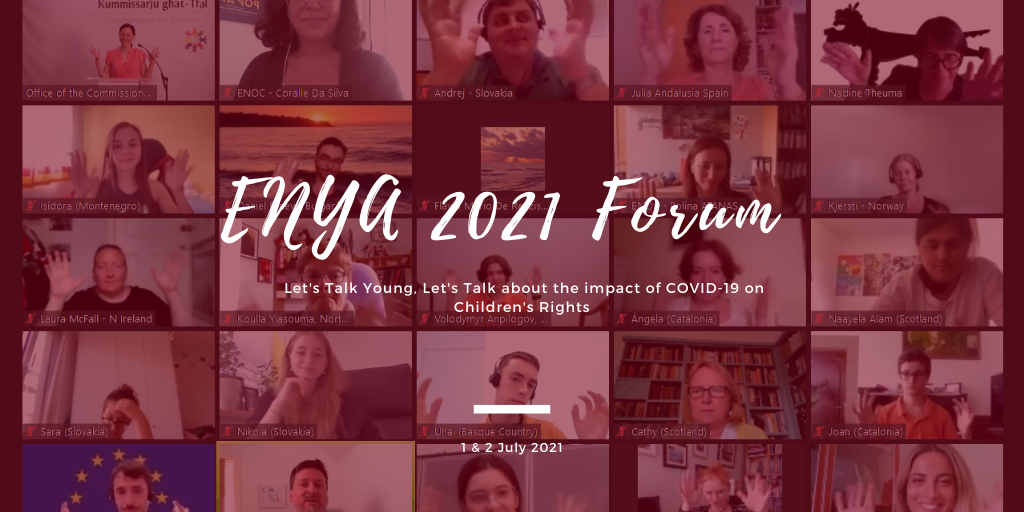“COVID-19: Learning for the future”
2021 Annual Theme
-
ENOC Synthesis Report "Mapping the impact of emergency measures introduced in response to the COVID-19 pandemic on children's rights in ENOC member states"
-
ENOC Position Statement "COVID-19: learning for the future"
-
ENYA Report and Recommendations on "COVID-19: learning for the future"
As a specific objective in 2021, ENOC has focused on assessing the impact of states’ responses to COVID-19 on children’s rights in Europe.
Building up on what has been completed in 2020 in the area of Child Rights Impact Assessment (CRIA) , ENOC has mapped how COVID-19 emergency legislation and practices have affected children’s human rights and wellbeing and what are the lessons learnt to ensure a better preparedness and capability to respond effectively to a similar challenge in the future.
A special Working Group, chaired by the Office of the Deputy Ombudsman for Children Greece, led the work on the priority theme supported by Simon Hoffman and Rhian Croke, independent expert advisors. The working group launched a special questionnaire to map the situation regarding COVID-19 and children's rights within the membership and collected feedback from 32 ENOC members from across Europe. Members' contributions have been collated and analysed in a Synthesis Report. Based on the findings of the Synthesis Report, ENOC organised the first round of discussion on the issue of "COVID-19: learning for the future" on the occasion of a working seminar online on 1 June 2021, aiming at informing the preliminary terms of the ENOC Position Statement on the same theme.
In parallel and in the framework of the ENYA (European Network of Young Advisors) child participation project, children and young people from across Europe expressed views on what aspects of their lives have been impacted by laws and policies put in place by governments to tackle the pandemic, and what mitigating measures and solutions can be found. Young people from 17 countries/regions participated in an ENYA online Forum “Let’s talk young, Let’s talk about the impact of COVID-19 on children's rights!” on 1-2 July 2021 to work on common and specific recommendations, to be included in ENOC's Position Statement. More information on the ENYA project here.
The 25th ENOC Annual Conference on CRIA and 25th General Assembly meeting took place on 27-29 September 2021. The Conference was hosted by the Office of the Deputy Ombudsman for Children Greece.
Other activities conducted by ENOC on the issue of COVID-19 and children’s rights:
• ENOC-UNICEF Report on Ombudspersons and Commissioners for Children's Challenges and Responses to COVID-19 - June 2020
ENOC and UNICEF conducted in May 2020 a short online survey on Ombudspersons and Commissioners for Children’s responses to the new challenges generated by the COVID-19 pandemic. Twenty three ENOC members responded to the survey (Armenia, Basque country/Spain, Bulgaria, Catalonia/Spain, Croatia, Cyprus, Denmark, Estonia, Finland, France, Hungary, Jersey, Luxembourg, Malta, Moldova, Montenegro, Northern Ireland/UK, Republika Srpska/ Bosnia & Herzegovina, Scotland/UK, Serbia, Slovakia, Slovenia and Wales).
Following this survey, nearly 60 representatives of Ombudspersons for Children’s offices and UNICEF participated in an online session on June 2nd 2020, to discuss the impact of COVID-19 on their work and on children’s rights in their respective countries, and share innovative practices. The main issues raised in the survey and during the joint online session are summarised in the Report « Ombudspersons and Commissioners for Children’s Challenges and Responses to COVID-19 » published today.
You can find the report here (in English).
• ENOC Bureau Statement on Children's Rights in the context of the COVID-19 outbreak - April 2020
While we all try to adjust to an unprecedented situation affecting countries worldwide, Ombudspersons and Commissioners for Children across Europe face a new challenge: how to continue upholding children’s rights in the current context of restrictions to address the COVID-19 outbreak.
ENOC's mission to ensure that the rights of all children, as guaranteed by the UN Convention on the Rights of the Child, are respected is even more important during the COVID-19 healthcare crisis, especially in the areas of:
• Information and Participation (Arts 12 and 13 UNCRC)
• Protection from violence and abuse (Arts 19 and 34 UNCRC)
• Rights to health and development, to benefit from social security, and an adequate standard of living (Arts 24, 26 and 27 UNCRC)
• Education (Arts 28 and 29 UNCRC)
The rapidly evolving situation will continue to massively affect children in general and aggravate the conditions of the most vulnerable groups. ENOC and its members will continue to closely monitor the situation of all children, as well as the responses from local, national and European authorities during and after the end of isolation measures. We will continue to share critical information, good practices and experiences to keep children and their families safe and guarantee children’s rights under the UN Convention on the Rights of the Child (1989) and other relevant European and International Human Rights instruments.



